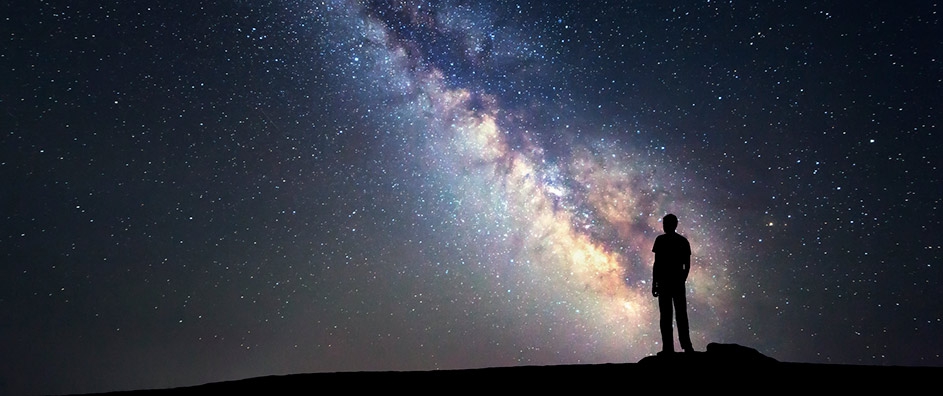The views expressed in our content reflect individual perspectives and do not represent the authoritative views of the Baha'i Faith.
The universe that we observe has precisely the properties we should expect if there is, at bottom, no design, no purpose, no evil, no good, nothing but pitiless indifference. – Richard Dawkins, River Out of Eden: A Darwinian View of Life
An honest man, armed with all the knowledge available to us now, could only state that in some sense, the origin of life appears at the moment to be almost a miracle, so many are the conditions which would have had to have been satisfied to get it going. – Francis Crick, Life Itself: Its Origin and Nature
One of the biggest philosophical and spiritual debates the world has ever witnessed comes down to the basic question embodied in these two quotes—does the universe have a designer?
Atheists argue no, and mainly subscribe to Dawkins’ “pitiless indifference” viewpoint. Without a designer, an architect, a Creator, they say, we live in a world where the creative force consists only of the workings of nature, a blind process of genetic evolution sufficient in and of itself to explain the origin and evolution of life.
Charles Darwin, the new atheists maintain in books like Dawkins’ The Blind Watchmaker and Darwin’s Dangerous Idea by Daniel Dennett, basically discovered that the generation and natural selection of life worked algorithmically, in a mechanically predictable fashion, without needing a first cause or creator.
The other side of the argument, sometimes referred to today as “intelligent design,” hearkens back to Socrates, Plato, Aristotle, al Ghazali, Galen and Thomas Aquinas:
We see that things which lack knowledge, such as natural bodies, act for an end, and this is evident from their acting always, or nearly always, in the same way, so as to obtain the best result. Hence it is plain that they achieve their end, not fortuitously, but designedly. Now whatever lacks knowledge cannot move towards an end, unless it be directed by some being endowed with knowledge and intelligence; as the arrow is directed by the archer. Therefore, some intelligent being exists by whom all natural things are directed to their end; and this being we call God. – Thomas Aquinas, Summa Theologica.
This clash of ideas about our human origins exemplifies the typical science vs. religion debate. Atheists believe that science explains all, and will eventually figure out how life began—scientifically. Those who believe in a Creator say that only God could create all life. But here, at the nexus of that debate, neither science nor religion sheds much light on this actual question: How did life emerge?
No one, you might be surprised to know (not even Darwin himself), has a clue:
…science as yet throws no light on the far higher problem of the essence or origin of life. – Charles Darwin, The Origin of Species
The origin of life remains one of the great scientific mysteries. The central conundrum is the threshold problem. Only when organic molecules achieve a certain very high level of complexity can they be considered as ‘living’, in the sense that they encode a huge amount of information in a stable form and not only display the capability of storing the blueprint for replication but also the means to implement that replication. The problem is to understand how this threshold could have been crossed by ordinary physical and chemical processes without the help of some supernatural agency. – theoretical physicist Paul Davies, God and the New Physics, p. 68.
Science, despite its brilliant record of discovery and knowledge during the past few centuries, hasn’t figured this one out yet, or even come close. We simply do not know how life got its start, and not for any lack of trying, either. Thousands of scientists have worked on this fundamental question for more than two hundred years, but their research has not only failed to come up with answers, it has only succeeded in raising more questions.
The Baha’i teachings actually offer a unique solution to the creation conundrum, this hidden mystery of the origin of life. Rather than taking a purely Darwinian approach or relying on a strictly creationist “faith” to answer the question, Baha’is believe in the essential agreement of science and religion—and suggest a reasonable and logical new path toward a solution. In this short series of essays, we’ll look at both sides of the debate, try to fairly evaluate them from scientific and religious points of view, and attempt to describe the Baha’i outlook on this complex issue:
I beg of God that He will assist thee to comprehend the mysteries that lie at the heart of creation, and will draw away the veil from before thine eyes… that the well-guarded secret may be disclosed unto thee, and the hidden mystery be revealed as clear as the sun at noonday… – Abdu’l-Baha, Selections from the Writings of Abdu’l-Baha, p. 157.
Next: Our Biggest Unanswered Question: How Did Life Begin?
You May Also Like
Comments

















the potential to cause anxiety and
depression. I struggled for years with a low-level but abiding fear that the
"pitiless indifference", or an actually malevolent primal cause, would turn out to be true. In order to sleep
at night, I knew that "malevolence"
possibility had to be addressed first.
I couldn't think of a logical reason for
humanity to deserve such a curse.
Even if there did happen to be a perverse and sadistic tone to creation, I also knew that people
were in the same fix together, and ...
our shared identity could at
least allow us some peace of mind,
independent of God or whomever.
Maybe even before working on the
next problem, the "indifference"
idea, I encountered in print a reassuring theory: something to the
effect that our ability to imagine
a particular thing is proof of its
existence on some level. Because
I would rather believe in God, and
there seems to me a huge amount
of "circumstantial" evidence for
His existence, the final step to faith
was easy for me!